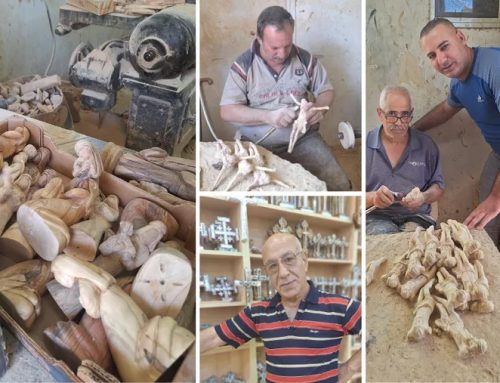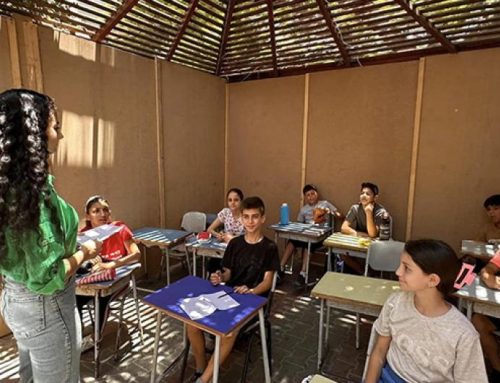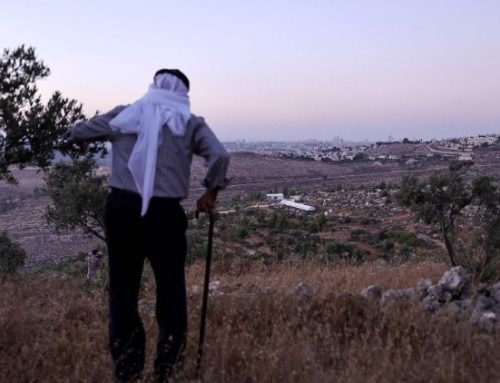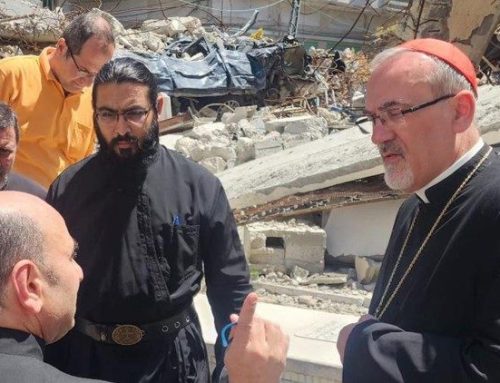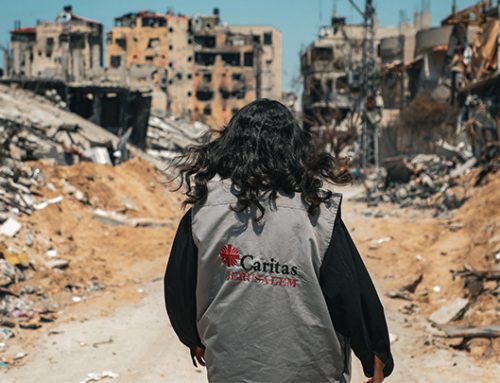The need of the day requires that the dimension of advocacy be integrated in our strategic action. Indeed, confrontation with the suffering of those affected by violence and poverty calls for not only a specific response of aid, but also interventions to denounce unfair structures that are often the cause of human suffering. The use and/or the role of the media could be a tool for advocacy.
International Church Advocacy for Peace in Israel and Palestine: Media, disinformation/information
The need of the day requires that the dimension of advocacy be integrated in our strategic action. Indeed, confrontation with the suffering of those affected by violence and poverty calls for not only a specific response of aid, but also interventions to denounce unfair structures that are often the cause of human suffering. The use and/or the role of the media could be a tool for advocacy.
I refer to advocacy as a planned piece of work that seeks to bring about change in a given context. It encompasses:
1.Policy analysis, evidence-based research and strategizing;
2.Campaigning, awareness raising and mobilizing; and
3.Lobbying and influencing decision- and/or policy-making.
Lobbying is a systematic effort to bring one’s analysis and recommendations to the attention of decision-makers in order to influence them. Getting one’s point/issue on their agendas!
In terms of advocacy potential, the WCC enjoys a comparative advantage with regard to many Member Churches and Church related organisations, including ecumenical partners. The WCC has a broad constituency across the world. Guided by the faith and by the social teachings, one is able to raise his/her voice in the face of grave human rights’ violations and threats to peace. We should strengthen the capacity to respond with advocacy initiatives in situations of conflict emergencies and human rights’ violations.
Expressing solidarity with affected partners is a must, but that is not enough. By listening and analysing the positions of victims and of partners living and working in conflict areas, the WCC international network can be mobilised for effective advocacy action in a “globalised solidarity.” In the case of the Israel and Palestine conflict, we should develop sustainable actions.
There could be two basic “functions” or roles when doing advocacy work: (1) Bringing an issue raised by your partners and their recommendations to the attention of national and/or international decision-makers; and (2) Advocating and proposing solutions, lobbying relevant decision-makers together with your partners.
Advocacy and lobby work usually require additional skills, training programmes and in some circumstances, the empowerment of programme officers, hiring of additional specialist staff and/or working together with existing advocacy and campaign departments.
Particularly in cases related to peace and security matters, it is important to build on the knowledge and capacities of local Churches and partners to provide information and analysis. The root causes of a conflict, for instance, must be understood in order to resolve it. Effective lobbying requires strong networks of the affected populations and solid monitoring and information gathering at the community level. It is extremely important to ensure that international advocacy is rooted in the views of the affected society; this gives legitimacy and provides an opportunity for empowerment of the affected society. However, independent advocacy is sometimes needed, e.g. when there is a high degree of political sensitivity.
For an advocacy initiative to be successful we must be clear about what changes we want to achieve, as well as who will deliver them. Who and on what level one can make the difference? Effective advocacy depends on the ability to inform, motivate and persuade a policy maker and/or compel him/her to take action. Different people will be persuaded at different times by different styles or arguments: moral – legal – practical.
Some examples of methods: direct lobby, indirect lobby, media, publications, capacity building/empowerment of beneficiaries and/or local partners, campaigning, training officials, public opinion, using electronic communications, website, etc.
Formats for message delivery include face-to-face meetings, letters, phone calls, executive briefing packets, fact sheets, policy forums, petitions, testimonies, public debates, press releases/press conferences, radio and television interviews, Pastoral Letters, diocesan newsletters, etc. More effective is the involvement of partners in the message delivery: partners visiting, photos and/or video testimonies, sharing their stories, etc.
Building up an international advocacy network takes time. One can make use of its own network – but it might happen that it is more constructive to link up with other networks. The formation of a coalition of networks could be helpful. That coalition should be fed by professionalism and a long-term commitment. Advocacy work is a dynamic process. So working with other faith-based networks, which all have a common approach, with the necessary flexibility, might be helpful as well.
An Urgent Action in cases of human rights violations and political statements. An Urgent Action is a direct intervention, mostly via letters/faxes, with political authorities. “Human Rights” are the criteria for action. Your own network, but also other international faith-based networks could be involved in Urgent Actions.
Possible partners in advocacy work via international networks, coalitions and/or campaigns, for instance: Caritas Internationalis and Caritas Europe, CIDSE, Pax Christi International, Franciscans International, Pax Romana, Luthern World Federation, Jesuit Refugee Service, Commission of the Bishops’ Conferences of the European Community (COMECE) and many more.
Potential Targets: Country-specific advocacy in peace and human rights issues ideally takes place at multiple levels, namely the national, regional and international levels. In addition, within each of these levels, it is possible to distinguish between two types of target groups:
A.Those which bear the responsibility for the violation – or neglect doing something about it and/or those that can exert pressure on the former in one way or the other, and
B.Those whose mandate makes them directly and specifically responsible for the promotion and protection of human rights.
Examples of regional level: European Union (European Commission – Council of the European Union – European Parliament), Council of Europe, African Union, etc
Examples of international level: United Nations (Security Council, Secretary General, General Assembly), International Criminal Court, International Financial Institutions, UN Human Rights Council, Treaty-based UN bodies, High Commissioner for Human Rights, etc.
Specific for EU on Middle East: Javier Solana (Secretary general of the Council of the European Union and High Representative for the Common Foreign and Security Policy, SGHR); and Marc Otte (EU Special Representative for the Middle East peace process).
Suggested action: make possible that one (or more) of the main Church leaders from Jerusalem can speak at the UN General Assembly in New York or at the UN Human Rights Council in Geneva. Invite media to report on it.
Human Rights Council – HCR
The UN Human Rights mechanisms are going through a period of transformation. For updates, go to www.ohchr.org
The HRC serves as a forum for dialogue on thematic issues on all human rights; undertakes a universal periodic review – based on objective and reliable information – of the fulfilment by each State of its human rights obligations and commitments; contributes, through dialogue
and cooperation, towards the prevention of human rights violations and responds promptly to human rights emergencies; makes recommendations with regard to the promotion and protection of human rights, etc.
Item 7 of the HRC is related to “Human rights situation in Palestine and other occupied Arab territories (including (1) human rights violations and implications of the Israeli occupation of Palestine and other occupied Arab territories; and (2) right to self-determination of the Palestinian people).
At the moment, there are different channels through which the HRC can be approached:
“Special Procedures”: is the general name given to the mechanisms established to address either specific country situations or thematic issues in all parts of the world and which comprise Special Rapporteurs and Thematic Working Groups.
Special Rapporteurs are individuals appointed by the HRC to look into particular subjects or areas of human rights violations. They present an annual report to the HRC, with the results of their investigations over the year, and with recommendations for action. In the meantime, they communicate constantly with governments, and undertake fact-finding missions where possible. When they are told about urgent situations, they can write to the relevant government directly.
There are two kinds of Special Rapporteurs: some investigate the human rights situation in a particular country (for instance Haiti or Sudan) and some investigate a particular theme (for instance adequate housing, freedom of opinion and expression, freedom of religion or belief, human rights defenders, internally displaced persons, minority issues, racism, etc.). John Dugard is the Special Rapporteur on the situation of human rights in the Palestinian territories. His report was presented recently, on 8 June 2008, at the HRC on Item 2.
Working Groups to look into particular issues: They send out letters almost immediately, in the hope of getting quick answers, and possibly saving lives. Examples of Working Groups: on the use of mercenaries, on Arbitrary Detention or Enforced or Involuntary Disappearances, etc.
“Direct Petitions to the Council” written by individuals or NGOs, asking to investigate patterns of human rights violations. Anyone can write such a petition. The functioning of this method can be questioned.
“Testify” at the meetings and special sessions of the HRC: The Council sets aside time on each of its agenda items for NGOs to take the floor. Make written and/or oral interventions at the HRC, mostly effective via joint statements of a group of like-minded NGOs. Organising parallel events or briefings during the Council’s sessions. Organise contacts and meetings with governmental delegates. Producing, circulating and presenting position papers on a given issue.
The “UN Sub-Commission on the promotion and Protection of Human Rights” will be replaced by the “HRC Advisory Committee.” It is composed of 18 experts who made up, what is often described as, a “think tank” for the HRC as its central task is to assist the HRC in its work in specific areas relating to the prevention of discrimination of any kind in the exercise of human rights and fundamental freedoms and the protection of racial, national, religious and linguistic minorities. NGOs are allowed to participate in these meetings.
The HRC can hold special sessions. So far 4 in total, of which one on Darfur (December 2006). Three special sessions were held on situations in the Middle East in July, August and November 2006. Following the events in Beit Hanoun, Gaza, on 8 November, an Urgent High Level Fact Finding Mission to the occupied Palestinian territories was established, including Beit Hanoun. The lack of reply from Israel had been interpreted as a refusal of that country to have this Mission doing its job. Nevertheless, a report from Archbishop Desmund Tutu, Head of the Mission, and of Christine Chinkin, member, has been given at the HRC on 13 June 2007. NGOs can submit their own reports and contact the members of the Mission.
Treaty-based UN bodies or mechanisms are composed of experts in human rights work nominated by his/her government but sitting as an independent person. There are as many bodies as there are treaties. These bodies or Committees have to monitor the existing treaties. An example is The Committee on the Elimination of Discrimination against Women (CEDAW). NGOs can approach these Committees through: providing comments on whether the State has complied with the treaty submitting statements in a so-called shadow-report – or – provide information to the Committees in order to update them, lobby them and/or present new issues that might have arisen. This mechanism applies only for those States that have ratified the treaties and have reported. The problem is with those States that have not ratified the treaties. Implementing the treaties is the other challenge.
The High Commissioner for Human Rights serves as the coordinating office for all the UN’s human rights activities. The Commissioner responds to serious violations of human rights, undertakes preventive human rights action, promotes the establishment of national human rights infrastructures and undertakes human rights field activities and operations. The Commissioner’s office also conducts field visits and fact-finding missions. On 5 June 2007, High Commissioner Louise Arbour issued a statement calling for human rights framework in search for lasting solution between Palestinians and Israelis. More at www.unog.ch/unog/website/news_media.nsf
Suggested action: prepare joint written and oral interventions to be submitted to the UN Human Rights Council; prepare specific reports for the Special Rapporteurs. Inform the media about your action taken.
Media: disinformation/information
Media can be a powerful tool to build public opinion and ‘harass’ the governments but your message has to be “newsworthy” in order to attract media interest. Think of a targeting media that “your” decision-maker is listening to. However, be aware that using the media as a vehicle for lobbying can backfire; after all, we do not control them. Also, politicians might feel compelled by the media to take a stance too early; they will not like having to go back on their judgment and will blame you if you have pushed them to take a stance too early.
Some media are partial on the Israeli & Palestine conflict. A Church leader, politician or a NGO, easily ends up in one of the two camps: pro-Israel and anti-Palestinian, or pro-Palestine and anti-Israel. The use of Internet makes it terribly difficult to control disinformation on what was said or done.
A recent example is the “NGO Monitor; Promoting Critical Debates and Accountability of Human Rights NGOs in the Arab Israeli Conflict” based in Jerusalem. On 12 April 2007, Pax Christi International and Pax Christi UK have been criticised, on 3 pages, with a lot of links to prove that the position is anti-Israel and pro-Palestinian: “its activities related to the Middle East reflect an adoption of the Palestinian narrative and utilise international legal and human rights rhetoric to delegitmize Israel.” It was decided not to react to this example of disinformation. We see it as a sign of appreciation for the work we are doing and the best answer is to just go on working for peace, truth and justice. Do not fear criticism!
The media could be the “window to the world.” Objective information is a requirement. Sometimes, media information in the news is not enough to change public opinion and policy decision makers. Media, public opinion and politics has to feed each other. The attention of the (international) media on the conflict has decreased, especially on national television channels. Media can dominate the public opinion. Mostly facts and stories covering violence come in the news. Our approach should be: make news and take the initiative in contacting journalists and media channels. Put the issue on the media-agenda.
Amman, 19 June 2007
Fr. Paul Lansu
Senior Policy Advisor on Security and Human Rights
International Secretariat Pax Christi International
E-mail: paul@paxchristi.net
www.paxchristi.net

